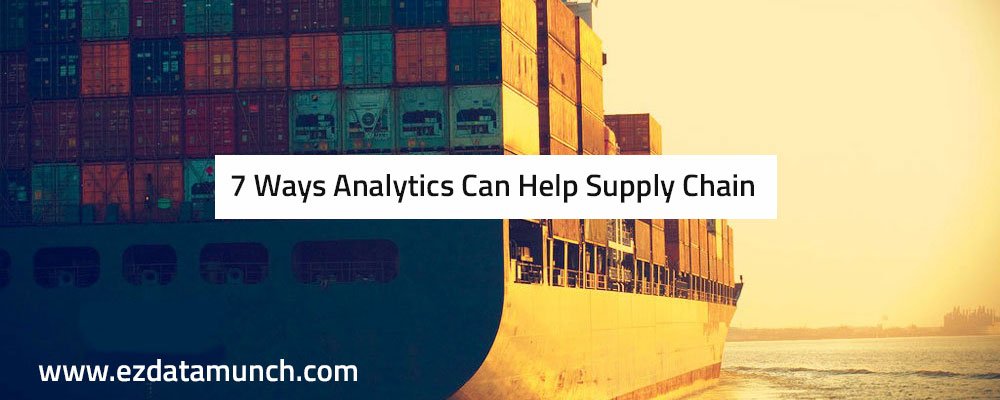Multiple factors affect the success of the supply chain process. These factors can be divided into four broad categories Political, social, economic, and technology. Each category encompasses various elements such as increased regulatory pressure, environmental concerns, demand for more sustainable products, and efficient processes about the political category. The social category consists of elements like continuously changing demographics, lifestyle, and social trends, more informed and knowledgeable buyers, and social channels influencing buyer behavior. Economic conditions are driven by costs and recession. Technology factors include mobile, big data, cloud, data storage, and more. Every organization has certain goals and objectives to achieve. The most crucial objectives are finding suppliers with better quality, improving the defect rates, improving communication and collaboration with the suppliers, and reducing lead time. Companies often face challenges where they rely on the services of one vendor. The risk of delayed delivery of products, price changes, or stock is quite high. Many companies have opted for supply chain analysis to get rid of underlying redundancies in their processes. Supply chain analysis can help companies track even the minutest of change that is crucial and could have been overlooked in a daily business process. The current business system demands real-time visibility in day-to-day activity to be ahead in the business and make informed and profitable decisions. Thus, a smart supply chain analytics solution strategy can go a long way in simplifying supply chain processes. Below are the key benefits of having a comprehensive and smart BI solution.
1) Better Insights for Executives:
Executives work under immense pressure. Modern-day business environment leaves them with a very small window to look into every aspect of business. They need to ensure that their time is pragmatically utilized and that all the supply chain processes are aligned with business strategies. A comprehensive supply chain analytics system gives a real-time picture of all the key metrics. Most of the supply chain dashboards are mobile-enabled; thus, executives can view the reports anywhere and anytime. They are better connected with the organization’s goals and get complete access to multi-department performance scorecards. In short, a smart supply chain analytics tool gives end-to-end visibility of supply chain processes that can help executives make better decisions and uncover hidden business opportunities. Important supply chain dashboards for executives:
- Executive Dashboard
- Performance Analysis
- Balanced Scorecards.
- Safety and Regulatory Compliance

2) Improved supply chain strategy:
The current business environment is highly dynamic and fluctuating. The market is inflicted with rising fuel costs, changes in supplier location, competition from low-cost outsourcing, and recession. In this situation, business users need advanced supply chain analysis to make better strategies. From a supply chain per se, business users can have better supply chain networks and ensure the right number of supplier profiles. This helps in the efficient flow of operations. Smart supply chain analytics software also comes with a “what-if” analysis tool. Business users can use this tool to create various scenarios and select the best strategy that provides cost benefits and profitable outcomes. Important supply chain dashboards for improved strategy:
- Supply Chain and Network Design
- Supply Chain Sustainability
- Predictive / What-if Analysis
- Outsourcing and Partnership Analysis
- Multi-Division and Multi-Tiered Analysis
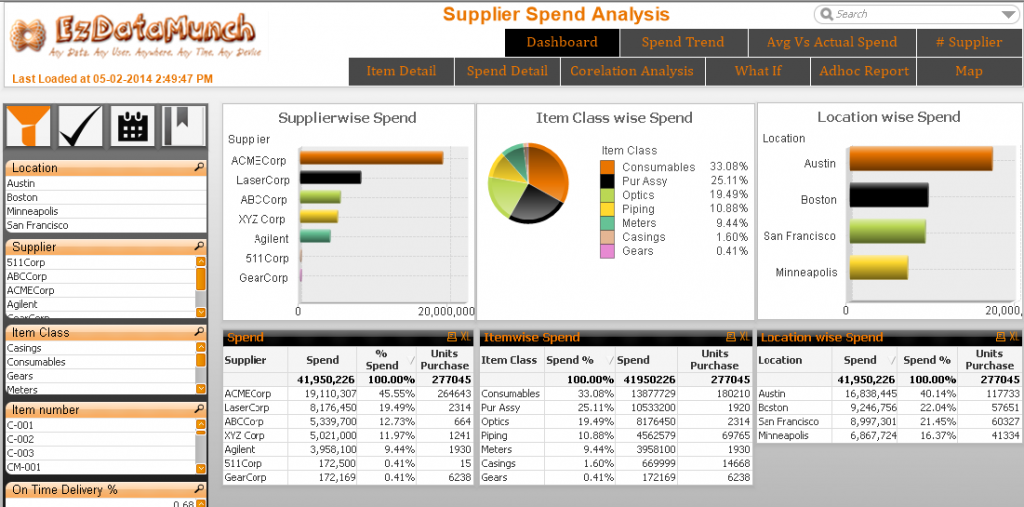
3) Enhanced Forecasting and Planning.
Demand volatility has made inventory and demand management a challenge. It has been observed that poor forecasts are ruling the supply chain industry. Traditional methods of inventory and demand management are no longer a profitable option. Demand management varies as per the industry type. In some industries, real-time data is highly critical to match the market for pricing and quantity, whereas in other industries, keeping replaceable or warranty stock is important. A smart supply chain analytics solution helps in managing cash flow and optimum application of working capital. Business users can reduce costs and ensure product availability by integrating demand signals into forecasts, improving the management of short-term demand volatility, and enhancing process collaboration. Important supply chain dashboard for better Forecasting and Planning:
- Financial Planning
- Demand Planning
- Collaborative Planning. Forecasting and Replenishment (CPFR)
- Category / SKU Rationalization
- Sales and Operations Planning (S&OP)
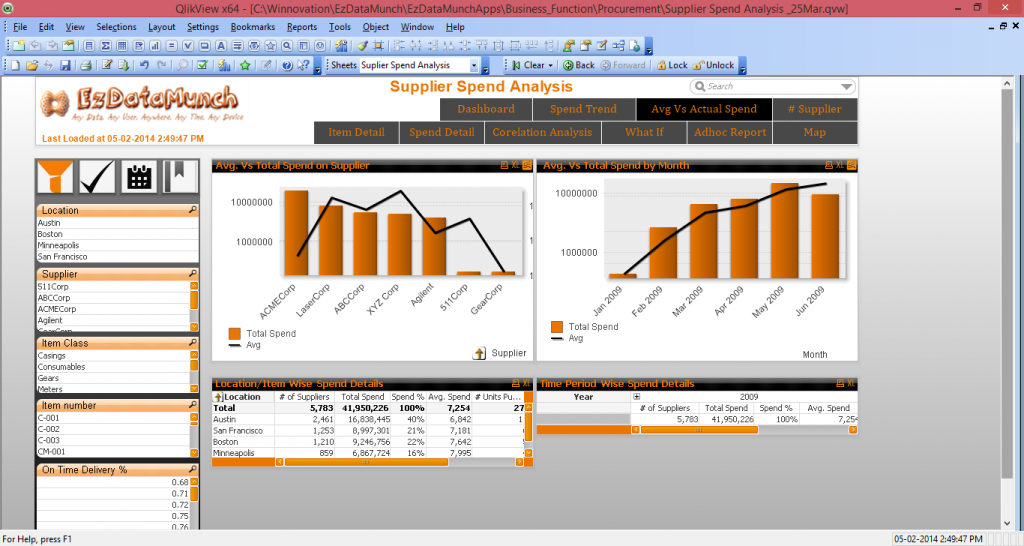
4) Improve sourcing and evaluate supplier performance:
Business users are on the lookout to save money and find better suppliers for their purchases. The availability of a multitude of suppliers in the market, both onshore and offshore has given an edge to sourcing companies. They have the option to source from the best supplier that provides value, quality, availability, and timely delivery. A smart supply chain analytics solution helps business users get complete insight into supplier scorecards. Business users can evaluate suppliers in real-time through the availability of self-service BI and make pragmatic decisions. Important supply chain dashboard for better sourcing and supplier performance:
- Contract Compliance and Management
- Buyer / Supplier Productivity
- Strategic Sourcing
- Procurement Analysis
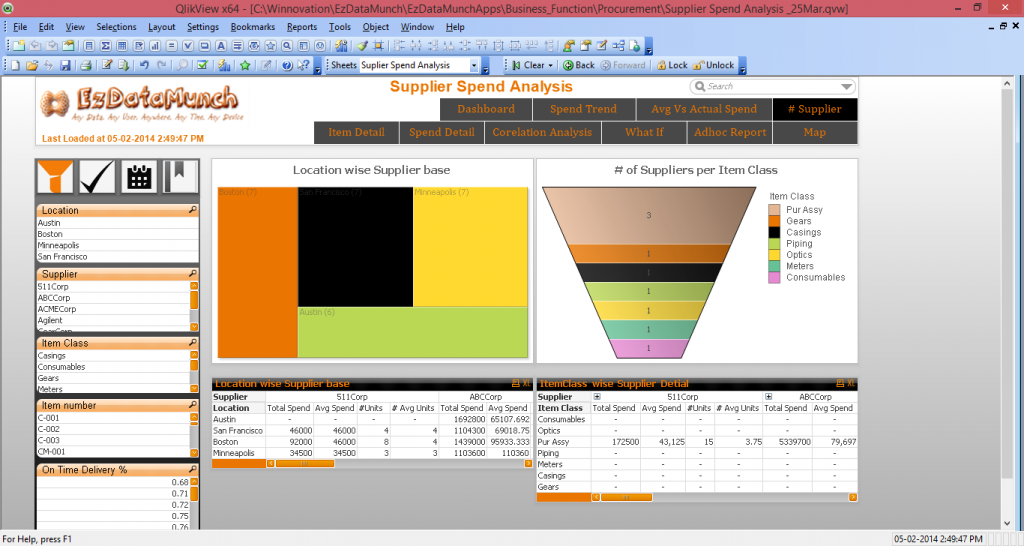
5) Improved production:
Production is based on factors such as demand for the product and availability of raw materials, manufacturing, machine capacity, labor and logistics. Having in-depth insight in all these activities is indispensable in current volatile economic environment. This ensures timely production, delivery of products, reduced wastage, improvement in quality, cost reduction and maintaining profit margins. Advanced supply chain analytics solution help business users understand and identify processes and product quality issues. Business users can control inventory, reduce wastage and increase plant efficiency. Real time data enables users to adhere to business goals and comply with regulatory standards. Important supply chain dashboard for improved production:
- Production planning and scheduling.
- Production efficiency
- Inventory Management
- Quality control analysis
- Event management
- Maintenance repair and overhaul

6) Distribution and Warehousing:
Space management and distribution is one of the most crucial factors in supply chain process. It’s vital to control cost at every level of supply chain process. Cost saving measures starts right from utilizing space in the best way possible. A company may have many locations as production and warehousing units. The challenge arises when a company is planning to expand or downsize. A smart supply chain analytics solution helps business user ascertain costs and savings associated with opening a new warehouse or manufacturing unit, total space required in every plant with respect to contributing factors, understand the manpower required in every plant to ensure optimum production and cost control. Important supply chain dashboard for warehousing and distribution:
- Picking accuracy and fill rates.
- Warehouse / Distribution center operations.
- Order management and fulfillment.
- Throughput analysis and tracking.
- Wholesale distributor analysis.
7) Improved transportation:
Delivering goods and services on time is highly crucial for the success of supply chain process. Timely delivery is critical to maintain its razor thin margins. On the other hand, fluctuating fuel cost impacts the bottom line and jeopardizes operations along with increasing the overall cost. For every operation, companies have to consider the factors such as fuel cost, labor charges, load, routes, proper network and more. One mistake in undermining the importance of any of these factors can cause companies to lose customer and money. A smart supply chain analytics solution helps business users evaluate transportation profiles. They can access the information of all the outsourced partners and delivery type. Smart supply chain analytics solutions also helps in adherence to lead-time and mitigate the delivery time. Important supply chain dashboard for improved transportation:
- Air, cargo, rail and mode analysis.
- Inbound and outbound transport.
- Global transport / cross border.
- Shipping and receiving analysis and alerts.
- Variable cost and lead time analysis.
- Third party logistics, carrier and delivery analysis.
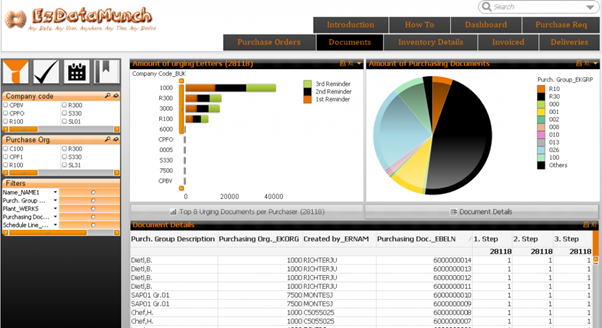
FAQ’s
What is analytics in supply chain?
Analytics in supply chain means using tools and techniques to analyze data related to how goods move from the place they’re made to the place they’re sold. It helps understand patterns, trends, and problems in this process.
How can analytics improve supply chain efficiency?
Analytics can help by predicting demand for products, so companies can make just the right amount of goods. It can also track shipments in real-time, identify areas where things get stuck, and suggest faster or cheaper routes for delivery.
Can analytics reduce costs in the supply chain?
Yes, it can. By pinpointing where resources are wasted, like having too much inventory or inefficient transportation routes, companies can cut down on unnecessary expenses. Analytics can also negotiate better prices with suppliers by analyzing market trends.
Can analytics make supply chains more reliable?
Absolutely. By analyzing historical data and current trends, companies can anticipate disruptions like delays in delivery or shortages of materials. This helps them plan ahead, find alternatives, or even prevent problems before they happen.
Is analytics in supply chain management difficult to implement?
It can be a challenge, but it’s doable. Companies need to gather and organize data from various sources, invest in software and expertise to analyze it effectively, and then make decisions based on the insights gained. It’s a process that requires time, resources, and commitment, but the benefits can be significant in the long run.

Milan Desai as a Chief Technology Officer has more than 20 years of industry experience in working with clients to solve business problems. Passionate about leveraging technology for improving the quality of life and optimize the use of resources. Currently, working on utilizing data to drive business decision making process and user understanding of key metrics that drive the organization and markets in general. Chief Technology Officer of EzDataMunch – the first BI Apps store in the world.

